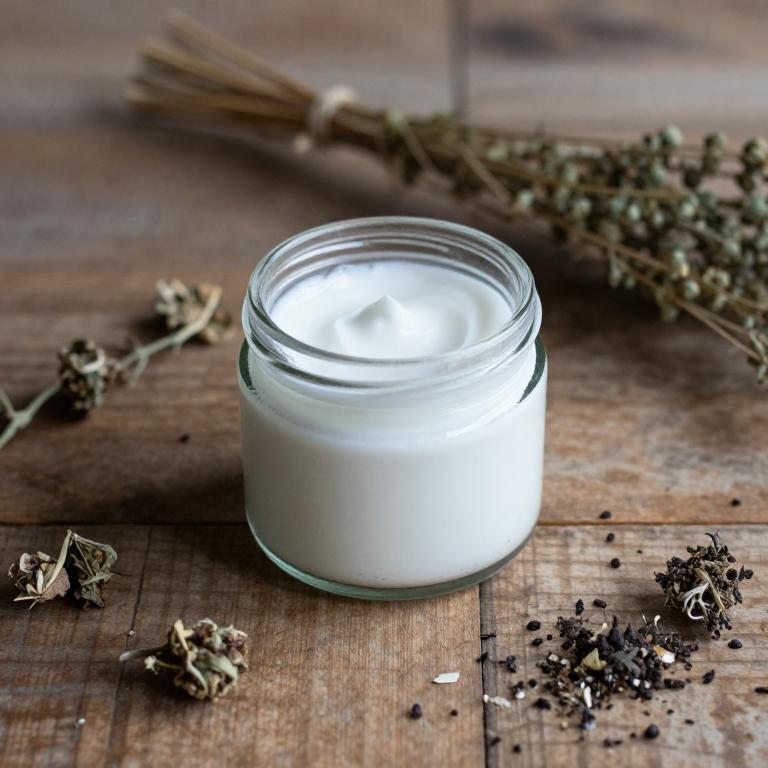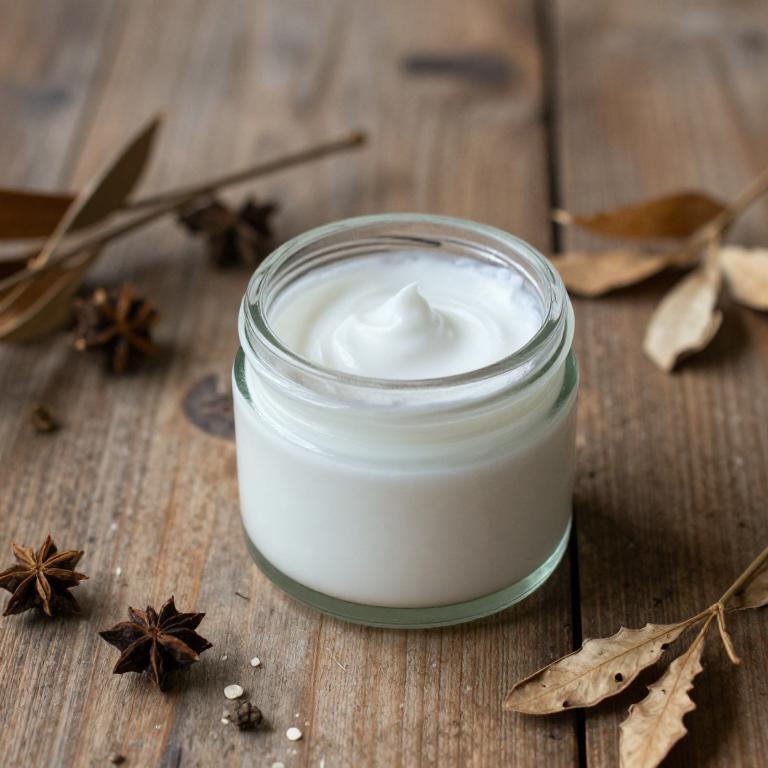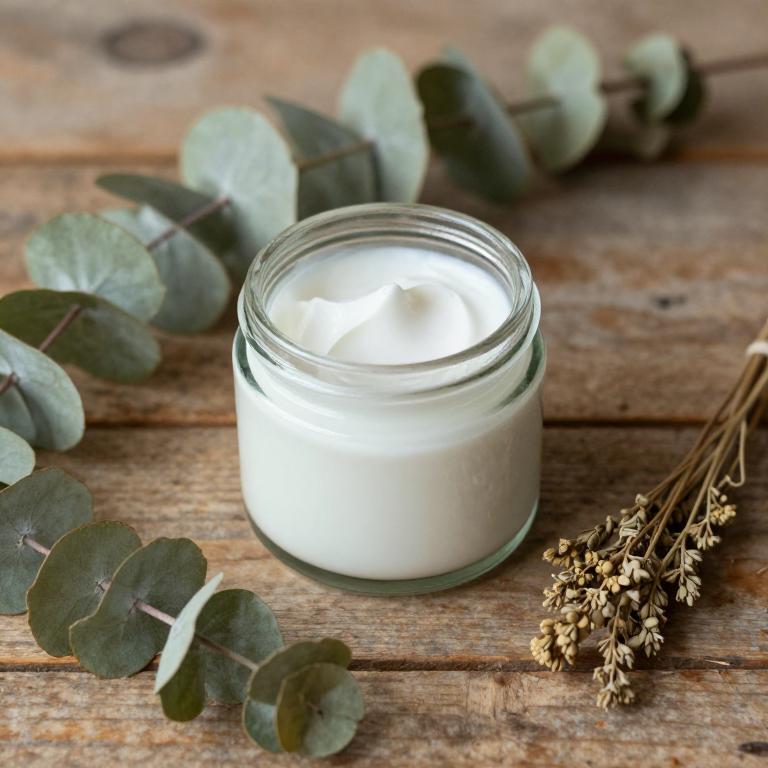10 Best Herbal Creams For Fungal Skin Infection

Herbal creams for fungal skin infections are natural topical treatments that incorporate plant-based ingredients known for their antifungal properties.
These creams often contain extracts from garlic, tea tree oil, neem, and eucalyptus, which have been traditionally used to combat fungal growth. They are generally considered safer than conventional antifungal medications, as they may reduce the risk of side effects and drug resistance. However, their effectiveness can vary depending on the specific fungal infection and the concentration of active ingredients.
It is important to consult a healthcare professional before using herbal creams to ensure they are appropriate for the type of infection and to avoid potential interactions with other treatments.
Table of Contents
- 1. Aloe vera (Aloe barbadensis)
- 2. Ginger (Zingiber officinale)
- 3. St. john's wort (Hypericum perforatum)
- 4. English lavender (Lavandula angustifolia)
- 5. Blessed thistle (Cnicus benedictus)
- 6. Lemon grass (Cymbopogon citratus)
- 7. Bloodroot (Sanguinaria canadensis)
- 8. Stinging nettle (Urtica dioica)
- 9. Ceylon cinnamon (Cinnamomum zeylanicum)
- 10. Eucalyptus (Eucalyptus globulus)
1. Aloe vera (Aloe barbadensis)

Aloe barbadensis, commonly known as aloe vera, is often incorporated into herbal creams due to its soothing and antimicrobial properties.
These creams are frequently used to treat fungal skin infections such as athlete's foot and ringworm, as aloe vera has been shown to inhibit the growth of certain fungi. The gel from the aloe plant contains compounds like aloin and lectins, which may help reduce inflammation and promote skin healing. While aloe-based creams can be a natural alternative to conventional antifungal treatments, they may not be sufficient for severe infections and should be used in conjunction with medical advice.
Overall, aloe barbadensis herbal creams offer a gentle, moisturizing option for mild fungal skin issues, but their effectiveness can vary depending on the specific infection and individual skin response.
2. Ginger (Zingiber officinale)

Zingiber officinale, commonly known as ginger, has been traditionally used for its antimicrobial and anti-inflammatory properties, making it a valuable ingredient in herbal creams for treating fungal skin infections.
These creams often incorporate ginger extract to help combat dermatophytes and other fungi that cause conditions like athlete's foot and ringworm. The active compounds in ginger, such as gingerol and shogaol, exhibit antifungal effects by disrupting the fungal cell membrane and inhibiting their growth. Regular application of zingiber officinale-based creams can alleviate symptoms such as itching and redness while promoting skin healing.
However, it is important to consult a healthcare professional for persistent infections to ensure proper treatment and avoid potential allergic reactions.
3. St. john's wort (Hypericum perforatum)

Hypericum perforatum, commonly known as St. John's Wort, is a herb traditionally used for its anti-inflammatory and antimicrobial properties.
Herbal creams containing Hypericum perforatum are often used to treat fungal skin infections due to their ability to inhibit the growth of fungi. These creams may help reduce redness, itching, and other symptoms associated with conditions like athlete's foot or ringworm. However, it is important to consult a healthcare provider before using these creams, as they may interact with certain medications.
While some studies suggest potential benefits, more research is needed to fully understand their efficacy and safety for fungal infections.
4. English lavender (Lavandula angustifolia)

Lavandula angustifolia, commonly known as English lavender, is often incorporated into herbal creams for its antifungal properties.
These creams typically contain essential oils extracted from lavender, which have been shown to inhibit the growth of various fungi, including Candida and Trichophyton species. The anti-inflammatory and antimicrobial compounds in lavender, such as linalool and lavandin, help reduce redness, itching, and irritation associated with fungal infections. When applied topically, lavender-infused creams can provide a natural and soothing alternative to conventional antifungal treatments.
However, it is important to consult a healthcare professional before using these products, especially for severe or persistent infections.
5. Blessed thistle (Cnicus benedictus)

Cnicus benedictus, also known as blessed weed, is a plant traditionally used in herbal medicine for its antimicrobial and anti-inflammatory properties.
Herbal creams containing Cnicus benedictus are often formulated to treat fungal skin infections such as athlete's foot and ringworm by inhibiting the growth of fungi. The active compounds in the plant, including flavonoids and tannins, contribute to its antifungal effects by disrupting the fungal cell membrane. These natural remedies are favored by individuals seeking alternative treatments with fewer side effects compared to conventional antifungal medications.
However, it is important to consult a healthcare professional before using Cnicus benedictus creams, especially for severe or persistent infections.
6. Lemon grass (Cymbopogon citratus)

Cymbopogon citratus, commonly known as lemon grass, is a herbal plant that has been traditionally used for its medicinal properties.
Herbal creams containing Cymbopogon citratus are increasingly being explored for their potential in treating fungal skin infections due to their antimicrobial and anti-inflammatory effects. The essential oils extracted from lemon grass possess compounds like citral and myrcene, which exhibit antifungal activity against various dermatophytes. These creams offer a natural alternative to conventional antifungal treatments, reducing the risk of side effects associated with synthetic drugs.
However, further clinical studies are needed to fully establish their efficacy and safety for widespread use in managing fungal infections.
7. Bloodroot (Sanguinaria canadensis)

Sanguinaria canadensis, commonly known as bloodroot, is a herb that has been traditionally used for its potential antifungal properties.
Herbal creams containing sanguinaria canadensis are sometimes used to treat fungal skin infections due to the plant's active compounds, which may inhibit the growth of fungi. However, it is important to note that while some preliminary studies suggest its antimicrobial effects, more rigorous scientific research is needed to confirm its efficacy and safety for topical use. These creams should not replace conventional antifungal treatments without consulting a healthcare professional.
As with any herbal remedy, proper application and potential side effects should be carefully considered.
8. Stinging nettle (Urtica dioica)

Urtica dioica, commonly known as stinging nettle, has been traditionally used in herbal remedies for its anti-inflammatory and antifungal properties.
Urtica dioica herbal creams are formulated with extracts from the leaves and roots of the plant, which contain compounds like polysaccharides and alkaloids that may help combat fungal infections. These creams are often used topically to treat conditions such as athlete's foot, ringworm, and other dermatophyte infections. The natural ingredients in these creams can soothe irritated skin while providing a potential alternative to conventional antifungal treatments.
However, individuals should consult a healthcare professional before using these products, especially if they have sensitive skin or are undergoing other treatments.
9. Ceylon cinnamon (Cinnamomum zeylanicum)

Cinnamomum zeylanicum, commonly known as cinnamon, is increasingly being used in herbal creams for the treatment of fungal skin infections due to its potent antifungal properties.
The essential oils extracted from the bark of this plant contain compounds like cinnamaldehyde and eugenol, which have been shown to inhibit the growth of various fungal species. These herbal creams provide a natural alternative to conventional antifungal treatments, offering a soothing effect on the skin while combating infection. When applied topically, they can help reduce symptoms such as itching, redness, and scaling associated with conditions like athlete's foot and ringworm.
However, it is important to consult a healthcare professional before using cinnamon-based products, especially for individuals with sensitive skin or existing skin conditions.
10. Eucalyptus (Eucalyptus globulus)

Eucalyptus globulus, commonly known as eucalyptus oil, is often incorporated into herbal creams for its antimicrobial and anti-inflammatory properties.
These creams are used to treat fungal skin infections such as athlete's foot and ringworm by inhibiting the growth of fungi. The essential oils in eucalyptus globulus have been shown to possess antifungal activity due to their ability to disrupt fungal cell membranes. When applied topically, these creams can help reduce itching, redness, and inflammation associated with fungal infections.
However, it is important to consult a healthcare professional before using eucalyptus-based products, especially for individuals with sensitive skin or allergies.